Journey through Genesis 19, exploring divine judgment, mercy, and the complex narrative of Sodom and Gomorrah's destruction in this insightful Bible study.
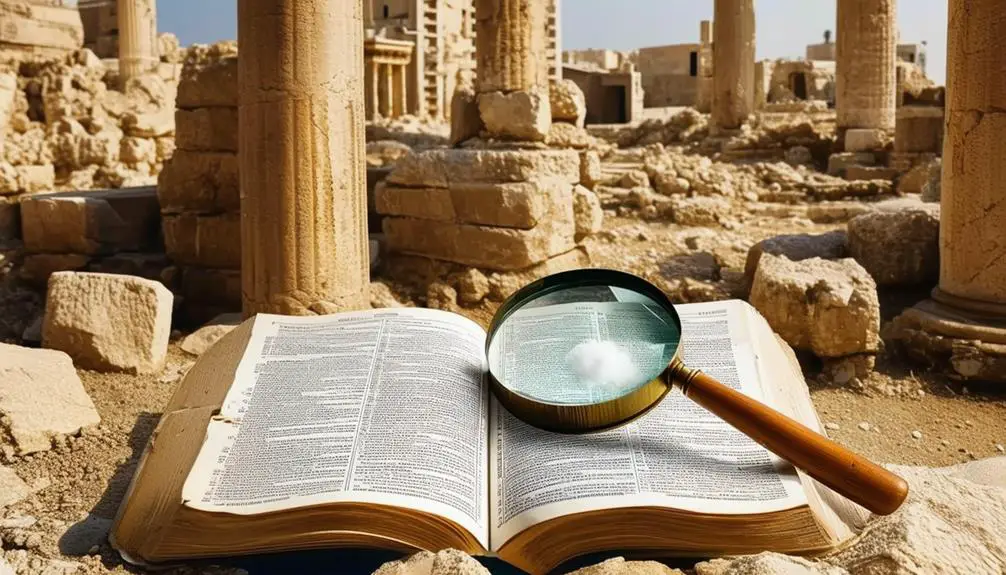
Bible Study – The Book of Genesis – Chapter 19 – Summary and Analysis
Genesis 19 deals with heavy themes of divine judgment and mercy. It tells the tale of Sodom and Gomorrah's destruction due to rampant sin, and Lot's family's preservation via angelic intervention. This chapter showcases intricate interplay between human decisions, divine involvement, judgment, and mercy. You'll engage with complex characters, nuanced moral dilemmas, and penetrating theological depths, particularly surrounding God's retribution and sovereignty. As you further explore this chapter's intricacies, you'll uncover profound spiritual truths and wrestle with common misinterpretations, leading to a deeper understanding of this pivotal biblical narrative.
Key Takeaways
- Genesis 19 focuses on the divine judgment and mercy displayed in the destruction of Sodom and Gomorrah due to grave sins.
- Key characters include Lot, who exhibits leadership despite moral dilemmas, and his wife, whose disobedience serves as a warning against defying divine instructions.
- The narrative explores notable themes such as divine intervention, religious symbolism, and God's active involvement emphasizing his sovereignty and providence.
- The chapter illustrates severe penalties for moral violations, emphasizing the balance between mercy and judgment in divine intervention.
- Genesis 19 provides a lens for contemporary societal reflection and analysis, focusing on themes of hospitality, justice, divine judgment, and familial relationships.
Chapter 19: Brief Summary
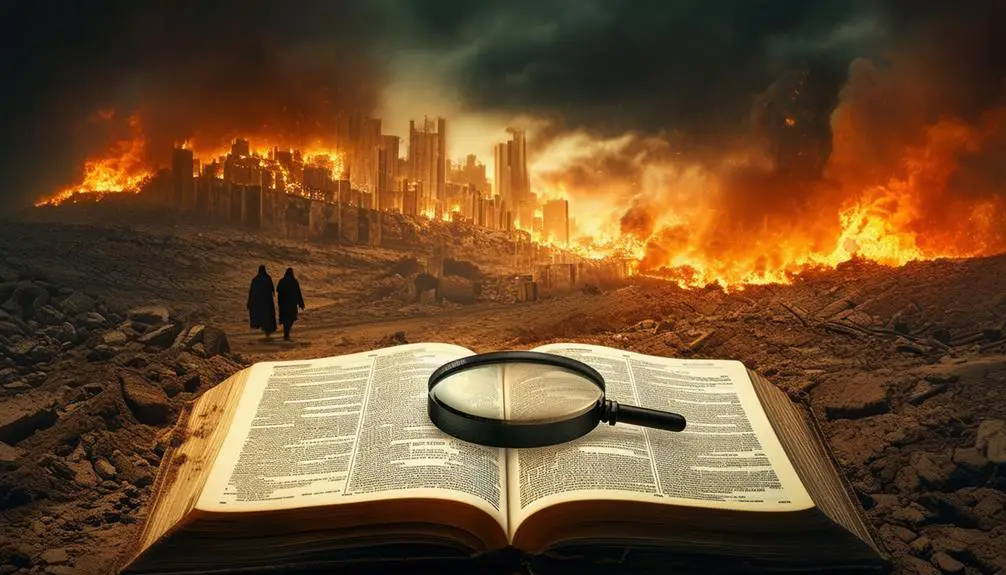
In Genesis Chapter 19, you'll observe a narrative steeped in divine judgment and mercy, focusing on the destruction of Sodom and Gomorrah due to their grave sins. This chapter chiefly revolves around two key aspects: 'Lot's Choice' and 'Angelic Intervention'.
Lot's choice is a pivotal point in this passage. As a resident of Sodom, Lot finds himself in a morally compromised situation. He's offered the choice to flee the impending doom, a choice presented by angelic messengers. His decision to heed their warning underscores his righteousness, despite his flawed environment, and marks a critical juncture in the narrative.
The second aspect, angelic intervention, brings a supernatural dimension into play. Two angels are dispatched to Sodom with a divine mandate: to rescue Lot and his family before the city's obliteration. Their intervention is instrumental in not only preserving Lot's family but also executing divine judgment. The angels' role is a testimony to God's mercy amidst judgment.
In analyzing these two elements, 'Lot's Choice' and 'Angelic Intervention', you'll glean a deeper understanding of the narrative's intricacies. It's a blend of human decision-making, divine intervention, judgment, and mercy, all interwoven to form a compelling narrative of divine justice.
Unpacking the Narrative
Let's delve deeper into the narrative, examining the intricacies of the plot and the implications of each character's actions. Angelic intervention plays a key role in chapter 19 of Genesis, showcasing divine involvement in human affairs. This divine intervention is not without its complexities, as it often aligns with the personal dilemmas of the characters, most prominently Lot.
Lot's dilemmas are at the core of this chapter. He is faced with challenging decisions, such as offering his daughters to the townspeople or refusing to hand over his guests. His actions, while problematic, reveal his dedication to hospitality, a virtue highly valued in the ancient world. It's also important to note that his moral choices are influenced by the angelic intervention.
The narrative also deals with the theme of divine judgement. The destruction of Sodom and Gomorrah can be seen as divine retribution for wickedness, a storytelling device used to underscore the consequences of moral corruption.
In unpacking this narrative, it's crucial to contemplate these elements and their implications. This nuanced analysis allows for a deeper understanding of the text, fostering a thorough study of Genesis Chapter 19.
Key Characters Analysis
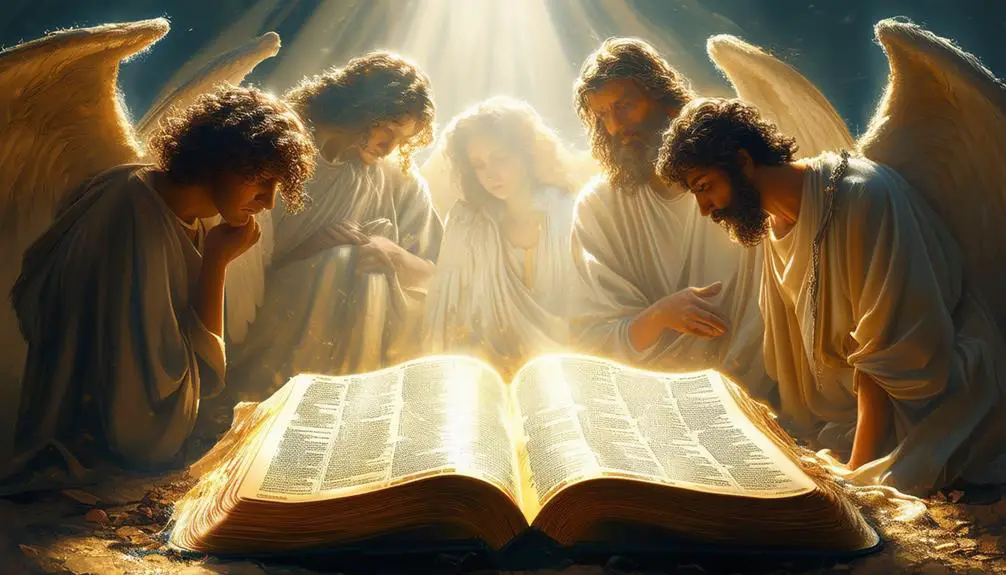
Delving into the heart of Genesis Chapter 19, we find it's the key characters who add depth to the narrative, each with their own set of virtues and flaws. Let's take a closer look at each of them.
Character |
Analysis |
|---|---|
Lot |
As the protagonist, Lot's leadership is central to the storyline. Despite his moral shortcomings, such as offering his daughters to the mob, Lot does exhibit hospitality and protects his guests. |
Lot's Wife |
Her disobedience to the angels' command and subsequent transformation into a pillar of salt serves as a severe warning against disobedience to divine instructions. |
Lot's Daughters |
Their controversial actions can be viewed as desperate measures in desperate times. |
The Mob |
Their violent intent towards Lot's guests reveals the depths of Sodom's depravity. |
The Angels |
Their intervention saves Lot's family from destruction, showcasing divine mercy in the midst of judgment. |
In examining these characters, we're able to gain a deeper understanding of the narrative. Genesis 19 is not merely about the destruction of Sodom and Gomorrah, but also about the characters' response to God's judgment and mercy.
Notable Themes Explored
Revealing the tapestry of Genesis Chapter 19, you'll find an array of notable themes weaved into the narrative, each contributing to its profound theological implications. One of these is Divine Intervention, a concept deeply embedded in the events of this chapter. You see God's active involvement in human affairs, portrayed through the angels sent to rescue Lot's family from impending doom. This intervention reflects the biblical assertion of God's sovereignty and providence, underscoring that divine power isn't merely passive, but a force that actively shapes human destiny.
Another theme is Religious Symbolism, which is particularly evident in the transformation of Lot's wife into a pillar of salt. This event isn't merely a historical anecdote, but a symbolic representation of disobedience and its dire consequences. The pillar of salt becomes a tangible symbol of the catastrophic result of defying God's commands, a stark warning to future generations.
These themes of Divine Intervention and Religious Symbolism are integral parts of Genesis Chapter 19, providing layers of meaning and theological depth to the narrative. They aren't just literary devices, but tools used to communicate profound spiritual truths.
God's Judgment: A Closer Look
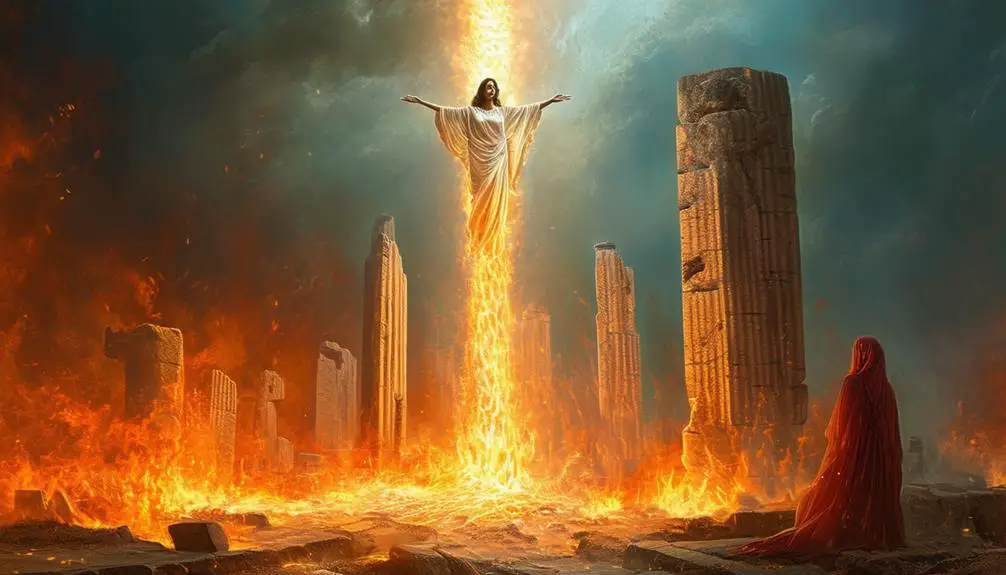
In scrutinizing God's judgment within Genesis Chapter 19, you'll encounter the profound potency of divine retribution, a force that eradicates Sodom and Gomorrah in response to the cities' pervasive iniquity. This divine judgment is a strong reminder of God's authority and the consequences of straying from righteousness.
- Divine Retribution: The destruction of Sodom and Gomorrah presents a vivid image of divine retribution. These cities symbolize a society marred by sin and corruption, which ultimately leads to their downfall. Their destruction is a stark reminder of the consequences of straying from God's commandments.
- Divine Mercy: Despite the severity of God's judgment, Genesis 19 also reveals divine mercy, specifically in the story of Lot. Lot's rescue exemplifies God's mercy for the righteous. Even amidst judgment, God's mercy endures, offering hope and redemption.
- Judgment Day: The events of Genesis 19 can be seen as a foreshadowing of Judgment Day. The divine judgment exhibited here serves as a cautionary reminder of the ultimate judgment to come.
In the end, Genesis 19 provides a complex study of God's judgment, interweaving themes of divine retribution, mercy, and the anticipation of Judgment Day. As you investigate further, you'll find that this chapter offers profound insights into the nature and consequences of God's judgment.
Sodom and Gomorrah: Historical Context
To fully grasp the gravity of divine judgment in Genesis 19, it's essential to understand the historical context of Sodom and Gomorrah. These ancient cities, believed to have existed near the Dead Sea, are shrouded in mystery and intrigue. Archaeologists and historians have worked tirelessly to uncover the realities of these cities, their cultural understanding, and ancient practices.
Sodom and Gomorrah were likely prosperous cities, thriving in an era where prosperity equated to power. They were hubs of trade, commerce, and cultural exchange, making them melting pots of various practices and ideologies. Yet, the societal norms were likely far removed from today's understanding of morality and ethics, which is perhaps why their practices were considered sinful.
In this context, the inhabitants of these cities were likely indulging in practices that were considered normal in their cultural understanding but were morally deviant by divine standards. This divergence in moral compasses set the stage for the divine judgment detailed in Genesis 19. Understanding this historical backdrop will provide a deeper, more profound comprehension of the narrative in Genesis 19 and the divine judgment it narrates.
Moral Lessons From Genesis 19
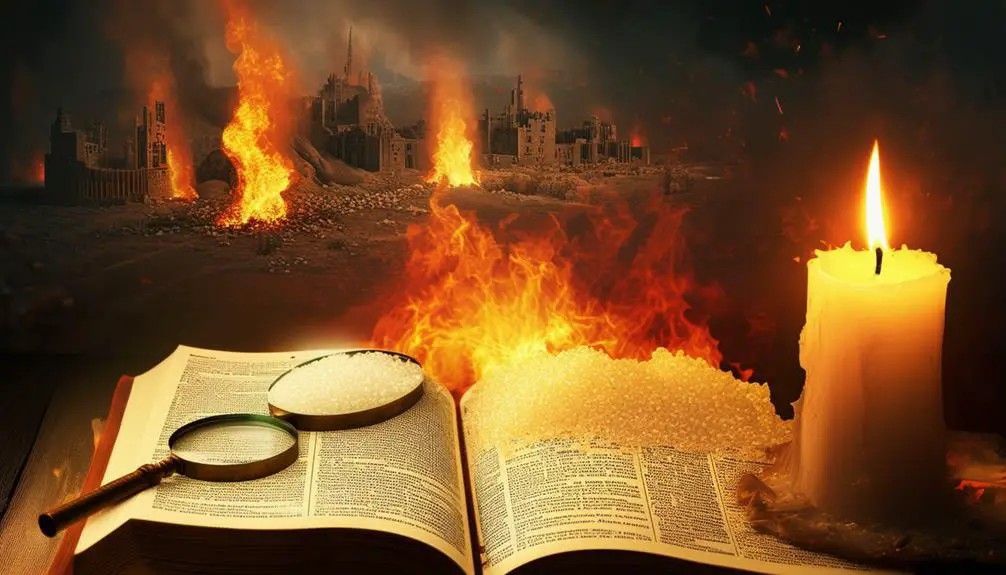
As you explore the moral lessons from Genesis 19, you'll grapple with the profound themes of disobedience and divine judgment. This chapter presents a stark portrayal of humanity's capacity for transgression and the severe repercussions that can follow. Through careful analysis, you can gain a deeper comprehension of these biblical principles and their enduring relevance in our contemporary society.
Consequences of Disobedience
Delving into Genesis 19, you'll uncover profound moral lessons about the severe consequences that stem from disobedience, serving as a stark reminder of the heavy price one may pay when defying divine orders. The narrative particularly illuminates disobedience repercussions and the degeneration caused by sinful behaviors.
- Perversion of moral values: The residents of Sodom and Gomorrah indulged in behaviors contrary to divine law, highlighting the moral decay that disobedience can lead to.
- Destruction of the cities: Disobedience led to divine wrath, resulting in the annihilation of both cities, a significant example of the physical repercussions.
- Lot's wife turned into a pillar of salt: Her disobedience of the divine command not to look back symbolizes the personal and fatal consequences of disobedience.
These instances provide important insights into the dire consequences of disobedience, underlining the call for obedience to divine commandments.
Understanding Divine Judgment
Examining the divine judgment portrayed in Genesis 19, you're confronted with a potent illustration of how moral violations can trigger severe penalties, shedding light on the concept of divine retribution in biblical doctrine. Divine Intervention, as seen with Lot's family, showcases God's mercy and judgment simultaneously. This chapter underscores that Divine Mercy is not a free pass for immorality; instead, it's God's gracious allowance for repentance and rectification. The destruction of Sodom and Gomorrah serves as an emblematic precedent of divine judgment, wherein God's tolerance of sin reaches its limit. Understanding divine judgment involves recognizing the balance between Divine Mercy and Divine Intervention, while taking heed of the severe consequences of persistent moral violations.
Common Misinterpretations Addressed
In this section, we'll tackle some of the most common misinterpretations associated with Genesis Chapter 19, shedding light on their origins and debunking them with sound theological scrutiny. Misinterpretation causes can range from cultural bias to a lack of historical knowledge. Meanwhile, appropriate interpretation techniques involve a careful examination of the text's original language, context, and historical-cultural backdrop.
- Lot's offer of his daughters: Some interpret this as an endorsement of misogyny. However, it's critical to understand the ancient Near Eastern hospitality codes. This doesn't justify Lot's actions, but contextualizes them.
- Destruction of Sodom and Gomorrah: Many attribute this solely to sexual immorality, overlooking the indictment of pride, gluttony, and lack of hospitality in Ezekiel 16:49.
- Lot's Wife: The misinterpretation lies in viewing her as a mere disobedient woman. It's more accurate to see her as a symbol of reluctance to let go of sinful ways.
Understanding these misinterpretations not only enriches your Bible study but also helps to prevent future misreadings. Remember, interpretation techniques must always be grounded in sound hermeneutical principles, historical context, and an earnest quest for truth.
Relevance of Chapter 19 Today
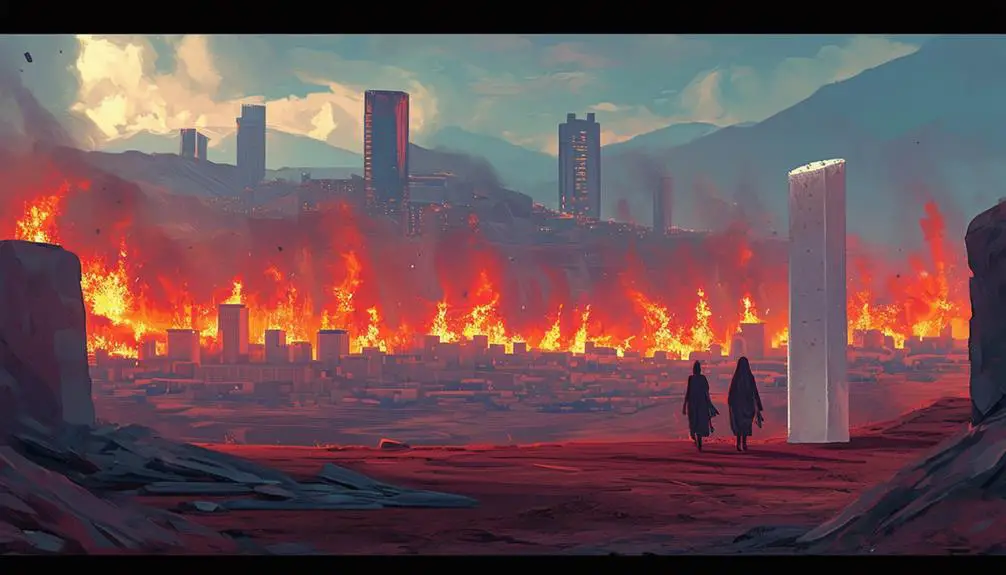
Now that we've addressed common misconceptions, let's explore how Genesis Chapter 19 speaks to contemporary society. The chapter's narrative, fraught with moral and ethical dilemmas, provides a mirror for modern implications and societal reflections.
In the story of Lot and the destruction of Sodom and Gomorrah, we find a stark commentary on hospitality, justice, and divine judgment. In a world grappling with issues of refugee crises and human rights, Lot's willingness to shelter strangers could serve as a parable on compassion and hospitality.
Furthermore, the fate of Sodom and Gomorrah, destroyed due to their wickedness, poses a poignant reflection on societal morality. The cities' destruction could be viewed as a warning against societal decadence and unbridled immorality: a reminder that unchecked vice can lead to downfall.
Genesis 19 also addresses the complexities of familial relationships and obligations, particularly in Lot's interaction with his daughters post-destruction. This narrative can be studied to understand the dynamics of power, authority, and morality within family units.
It's evident that Genesis 19, despite its ancient origins, continues to have significant relevance in the modern world. Its themes of morality, hospitality, justice, and family dynamics provide crucial lessons for contemporary societal reflection and analysis.
Frequently Asked Questions
What Are the Cultural Implications of Lots Decisions in Genesis 19?
Lot's decisions in Genesis 19 highlight major cultural implications. His hospitality towards the angels, despite societal norms, displays a sense of moral obligation. But, you're also faced with his moral dilemmas, such as offering his daughters to the mob. This reflects a patriarchal society valuing male guests over women. It's a complex scenario that brings up questions about cultural values and morality, both then and now.
How Does Genesis 19 Influence the Rest of the Bibles Narrative?
Genesis 19 dramatically shapes the Bible's narrative. Its morality tale sets a precedent of Divine judgment, influencing countless stories that follow. You see, it's not just about Sodom and Gomorrah's destruction; it's the ripple effect of those decisions. It's a moral compass, guiding interpretations of sin and punishment. So, every time you explore another biblical story, remember Genesis 19. Its influence is profound, shaping the narrative's backbone and imbuing it with lasting lessons.
Are There Different Interpretations of Genesis 19 Among Various Christian Denominations?
Yes, there're interpretational differences of Genesis 19 among various Christian denominations. Depending on the denominational perspective, some focus on the themes of divine judgement and hospitality, while others highlight sexual immorality. Your understanding can be influenced by your denomination's teachings, but it's always beneficial to explore other interpretations to gain a broader comprehension of this complex chapter. Interpretation may vary, but all seek to understand God's message.
What Archaeological Evidence Supports the Events Described in Genesis 19?
You're probably wondering about archaeological evidence that could back up Genesis 19. Well, it's a tricky area. Genesis Archaeology isn't an exact science, and historical verification for biblical events can be elusive. Some suggest that the ruins of Bab edh-Dhra and Numeira might be Sodom and Gomorrah, yet it's hard to definitively link these to the Genesis account. It's a fascinating field, but one full of debate and differing interpretations.
How Does Genesis 19 Connect With the Jewish Perspective of Sodom and Gomorrah?
In Genesis 19, you'll see the Jewish understanding of Sodom and Gomorrah's downfall. It's not about their sexual immorality alone, but rather Sodom's sinfulness in its cruel inhospitality and arrogance. Gomorrah's judgment came as a direct result of these sins, showing the divine mandate for justice and righteousness. It's a stark reminder of the consequences of failing to uphold these core Jewish values.


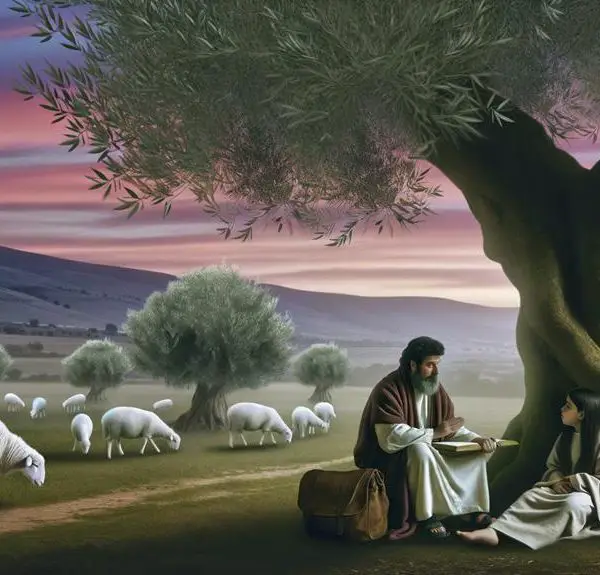
Sign up